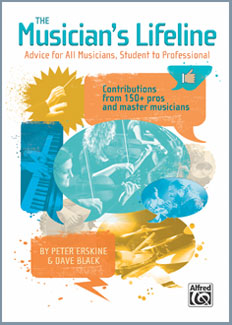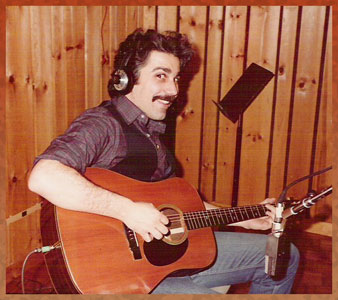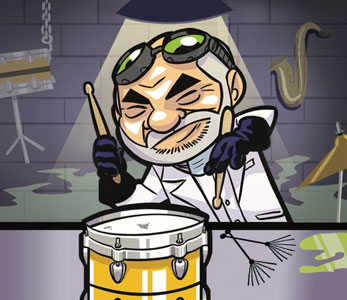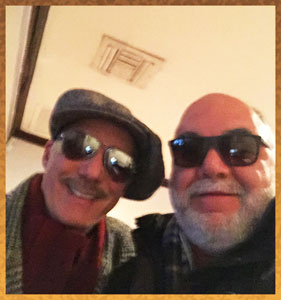During November of 2018, I received a typically warm e-mail from the wondrous drummer, and one of the greatest musicians that I have ever had the privilege of working alongside, Peter Erskine, with an invitation that went something like this:
"I'm co-writing a new book, along with Dave Black, called "The Musician's Lifeline." The book will be published next year by Alfred Music. The format of the book is almost pocket-sized, and it has been written with the goal of providing answers to questions that don't normally make their way into instructional or inspirational books.
We feel that the book will be greatly enhanced by including tips and advice from experts in the field
that may not have occurred to us. With that being said, I am writing to ask if you would be willing to participate in a survey consisting of the following seven questions:"
Of course, as Pete has become one of my closest friends over the many years that we have known one another and worked together, I was 'on board' for this immediately! In my haste to respond quickly, I made a rather crucial error, a most fundamental one. I did not read his e-mail fully, nor carefully, and missed a hugely important portion at the bottom. In his P.S., Peter wrote: "Below are examples of how I might answer these same questions." To say that his answers were terse and to the point - some not even being a full sentence - would be an understatement. But, the thoughts expressed were complete no matter what. And so, my original answers, now offered here in their completely unedited form, just rambled on, in a storytelling format as I am wont to do, with complete disregard for what Pete had been hoping for. It was, in a sense, a comedy of errors, of my own making!!!
At that point, I saw no other way than to re-submit my responses so that they would be closer to the to-the-point nature of Peter's examples. I think that he was much happier to have them in a way that would resemble the responses of so many other musicians who had contributed to the book. In the end, I was honored to have been asked, and I'm proud to be a small part of this wonderful book.
So, here now, for your entertainment and reading pleasure are my full, unedited initial answers to Peter's great survey. Forgive the bits & pieces of musicianly slang here and there.

SURVEY: STEVE KHAN
[1] What's the best advice you've ever received??
[SK] When I first arrived in New York, I knew two people, two musicians: David Friedman, the great vibraphonist, and John Miller, the great bassist. I really had little or no idea what I had gotten myself into moving here from Los Angeles. I was just 22 years old, having just graduated from university, and having only started playing the guitar at 19 yrs. of age. What was I thinking?!?!?!?! While waiting for an apartment to come available, John Miller, one of our great bassists and cynics, was kind enough to have let me stay with him and his then girlfriend Paula. John was helping me in many ways, amongst them, improving my reading skills. John was helping me in many ways, amongst them, improving my reading skills.
During the day, he would go out and do recordings and rehearsals, all the usual things that a musician does here. But, to help me, on occasion, he would come home with some of the guitar parts from that day. Actual guitar parts from the sessions.
One day, he put a guitar part on the music stand, and he said to me, "What do you see?" So, I answered as best as I could then - not being too worldly-wise or sophisticated - and each answer was greeted by John saying to me: "No!" Finally, he pointed to the upper left-hand corner, and he again asked me, "What does it say?" And I correctly answered: "Guitar!" And to that he then said, "That's right, and never forget that IT DOES NOT SAY: "Steve Khan" - it just says "guitar" - which means that any competent asshole can play this part.....YOU are not that special!!!"
I have never forgotten that - the fact that I am always replaceable, and that eventually, I AM GOING TO BE REPLACED!!! In each and every context, it has happened. But being prepared for that eventuality does not diminish how painful it can be.
[2] What's the best advice you've ever given?
[SK] This piece of advice comes to mind at this moment, though tomorrow, it could completely change, and I would have offered something else. Often times, with a student, I ask them, "How much time on a daily basis do you actually practice?" And they will often answer, "Oh, at least 10-12 hours per day, sometimes more!" Of course, I never believe that, because it usually means that, "I have a guitar in my hands 10-12 hours!" But that is NOT like real practicing. So, I try to get them to buy into this little piece of wisdom, or a strategy.
I offer something like this: Sometimes spending a good 15-20 minutes working on a particular task that you want to improve upon is far better than spending 15 hours with a guitar in your hands! By 15-20 minutes I mean that: You are concentrating on practicing - NO CELL-PHONES, NO TV, NO DISTRACTIONS or INTERRUPTIONS of any kind during that time - just HARD WORK!!! Yes, I know that in this age, this is most difficult for younger people, older ones too - but, in my view, THIS is what you have to do to try to improve!!!
[3] What's the one thing you would have done differently in your studies or career?
[SK] Unfortunately, there are many things that I would have done differently - getting older teaches you that. I have my share of regrets. I suppose that some of this is attributable to my personality flaws, but, I wish that I had used my practice time throughout my career in a much more efficient, diligent and organized manner. I have wasted a lot of time when I could have been much more productive.
Though I have said this before at my website and other places, I deeply regret some of the things that I have said in interviews when I was younger, and did not understand what the impact of those words was going to be. I hurt the feelings of people whom I respect and care about very much, people who helped me greatly - but, once those words are out there - no amount of apologizing is ever going to take them back, nor repair the damage that has been done. Thoughts of these things are never far out of my mind. and did not understand what the impact of those words was going to be. I hurt the feelings of people whom I respect and care about very much, people who helped me greatly - but, once those words are out there - no amount of apologizing is ever going to take them back, nor repair the damage that has been done. Thoughts of these things are never far out of my mind.
[4] Best travel advice??
[SK] Firstly, always put a small umbrella in your suitcase!!! You never know when you're going to need one!!!
But, more than that, when you are traveling with a band, or a group. NEVER separate yourself from the group. Remember, everyone is counting on you to be there, to be on time. If you choose to go off chasing fun, drinking or drugs, or a woman, and you leave the group, and choose to spend the night away from your hotel - you are just asking for trouble!!! And if you cause problems, even worry, for the group, the leader, or the road manager - your reputation amongst musicians and business people will quickly turn to shit!!! So, sometimes it can seem like you might not be the most fun person in the world, but perhaps, to be dependable and reliable is a far greater personal attribute?
[5] Best sight-reading advice?
[SK] First, the obvious! Practice, practice, and more practice! Try to play new music as often as is possible - and, in your private practice time, set the tempo, a metronome, where it is comfortable for YOU - you don't have begin reading something at breakneck speed - try to practice reading so that you get the feeling that you are doing well at it. Don't set yourself up to fail, or to be disappointed.
Also, always keep in mind that, if you arrive early to a rehearsal or a recording, there is usually some amount of time when you can sit quietly, and look at the part that you will be presented with, and then, look it over carefully, maybe even write in some fingerings, and that way, you will be ahead of the game. Arriving early is key!!! Of course, if the arranger or leader is late - you are screwed!!! This has happened to me many times!!! [Laughing!]
Finally, going in reverse order can be most helpful. By that I mean, if you are hearing some music in your head, in your imagination, and you are away from your instrument or a keyboard, try to visualize what it would look like on paper. Then, when you get home, write it down. Even writing out any music can be very helpful. Writing it out helps you to see what it looks like, and that way, when you are faced with something similar - you have already seen it!!! When writing something out, do not be sloppy!!! Remember, most Western music is in 4-bar phrases, so organize your lines and systems accordingly. Music can look like what it sounds like!!!
[6] Do you have any business advice for a musician??
[SK] There is a great expression in Spanish which reads: "Lo barato sale caro!" I have struggled to find a way to literally translate it in such a terse manner. One that conveys just how I interpret its meaning, but, to me, it basically says that: "If you start out by being cheap (trying to save money), you pay for it later!!!"
So, to musicians of all ages and genres, I would say a couple of things. [1] Never think of anything as a "demo"! Think of whatever you do as a finished product. [2] Never assume that a record business executive, producer, or fellow musician is going to "hear your talent" through an awful or sub-standard production. They are only going to hear what you've given them. And a lousy sounding recording might even force them to turn it off before it even finishes! [3] Don't paint yourself to be "poor little me" and you are not on the same level as those whom you might idolize or whose work you admire. In the end, we are all the same!!! You have to strive to present YOUR MUSIC in very much the same way as those whom you might want to emulate on some level. [4] Just because someone has digital recording programs in their computer, that does NOT make them a recording engineer! Nor does having a "mastering" program in their computer make them a mastering engineer. On these two crucial levels, you have to find a way to work with the best possible people, people who adhere to certain high-quality standards of audio, and under the best possible conditions! If your only goal is just to save money at all costs - you will pay for this later by having a lousy sounding product. Nothing, no mixes, are ever perfect - but, you have to try your best! If you have to beg, borrow, and steal - do it!!! Produce wonderful sounding audio!!! in very much the same way as those whom you might want to emulate on some level. [4] Just because someone has digital recording programs in their computer, that does NOT make them a recording engineer! Nor does having a "mastering" program in their computer make them a mastering engineer. On these two crucial levels, you have to find a way to work with the best possible people, people who adhere to certain high-quality standards of audio, and under the best possible conditions! If your only goal is just to save money at all costs - you will pay for this later by having a lousy sounding product. Nothing, no mixes, are ever perfect - but, you have to try your best! If you have to beg, borrow, and steal - do it!!! Produce wonderful sounding audio!!!
[7] Any advice relating to people skills?
[SK] I would say that, in learning to read people, you have to always trust your first impressions about that person. Trust in what you saw and heard - the feeling that you got from them. Don't allow yourself to be swayed by other things - for example, their great artistry, if they happen to be a musician, or in some other artistic field. One finds and learns that, over time, if you had trusted your first instinct about that person, you would have been correct, and might have spared yourself a bad experience.
[8] BONUS QUESTION (for non-drummers) What advice or request would YOU give to a drummer?
[SK] Firstly, as a former drummer - and a very bad one - I say this only with great love and respect for all drummers, especially all of the great drummers who have graced my recordings, or with whom I have shared a stage somewhere.
Making music is a team sport - we are all there to serve the music. If there is individual greatness there too - so be it - but the overall music is the only important thing! For me, no matter what the genre might be, I like it when we are all involved in a conversational style of playing - that can mean different things to different players - but the sense of give and take - of pushing and prodding on occasion is of great meaning to me. The grand gesture is not as important as sometimes a little flick of the wrist on the snare, a tap on the hi-hat or tom-tom with the off hand - it's like saying: "I hear you!" Leaving the space for that kind of commentary is crucial to me. Of course, the trio, any trio, for me, is the most intimate setting.
I learned a long, long time ago - a band will only go as far as the drummer is going to take them. It was true then, and it remains true today. But still, the overall music, that is king. No drummer can erase what is lousy music!!!
[Photos:
Steve Khan during the Mike Mainieri "WANDERLUST" sessions, taken by: Peter Erksine
Peter Erskine caricature as "Dr. Um"
Steve and Peter @ Via Italia in New York for lunch, 2015]
|


